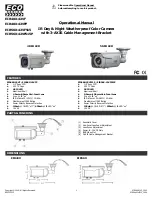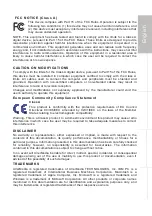
The numbers throughout the text refer to
the illustrations at the back of the book.
The camera (Illustration 1)
a
Film holder
b
Film door latch
c
Control panel
d
Viewfinder
e
Microscope fitting
f
Remote shutter button
g
Socket for power supply
h
Film counter (on back of film holder)
i
Adapter for 29mm microscope tube
The camera fits microscope photo or
viewing tubes with a diameter of 22.5mm;
the adapter enables the camera to be
attached to a 29mm tube.
j
Power supply
This provides power for the exposure
system and film processing rollers. The
camera requires a 12V 1.2 amp power
supply. Insufficient power may cause the
developer rollers to turn too slowly
(resulting in photographs with uneven
density or incomplete images); this also
may cause the display and/or exposure
system to function erratically. Too much
power can damage the camera.
The camera is shipped with either a
120V, 60 Hz power supply (PID 618091),
or a 100-240V, 50/60 Hz power supply
(PID 618089). Replacement power
supplies also are available: 120V, 60 Hz
(PID 618092); 100-240V, 50/60 Hz (PID
618090).
The microscope
Good photomicrographs are dependent
on good microscopy. Unless the
microscope is properly adjusted to
provide a good visual image, you cannot
produce a good photomicrograph. You
should be fully familiar with your
microscope, and how to adjust it for
photography. See pages 9-12 for basic
microscope information.
Attach the camera to the microscope
The camera should be attached to the
stationary (non-adjustable) viewing tube
or to the photo tube, if preferred.
1
Remove the eyepiece from the
microscope viewing tube (
2
).
2
If necessary, attach the 29mm adapter;
slide the adapter
all the way over the
camera’s microscope fitting (
3
), then
screw it on.
3
Orient the camera as shown (
4
), and
insert the fitting into the microscope tube.
Check that the camera is firmly seated.
If the camera rotates on the tube,
tighten the thumbscrew to hold it in
position.
4
Plug the power supply into an appro-
priate electrical outlet and then into the
camera (
5
).
4
English

































